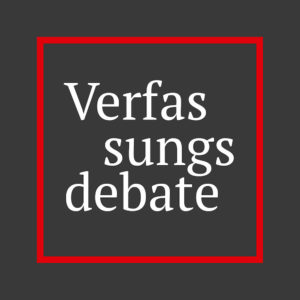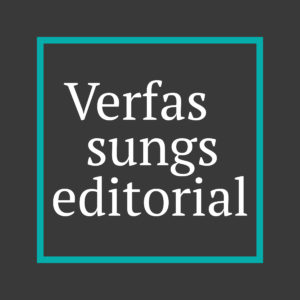What we do
Verfassungsblog is a global forum of scholarly debate at the interface of academy and society. We open up debates in public law – internationally, interdisciplinary and open access. We are independent and community-led. We offer innovative, academic publication formats for reviewed content. Our goal is to ensure maximum speed in our publication process, meeting public demand for academic expertise at its peak – without compromising on quality. As a non-profit organization, we are committed to transparency and fairness.
Founded in 2009 as a “blog” by Max Steinbeis, more than 3,500 experts from all over the world have now published and debate pertinent questions of constitutional law on Verfassungsblog, making their research visible to colleagues and the general public. Each of the 800 articles that Verfassungsblog publishes on average each year undergoes at least one editorial review by one or more members of our 8-person editorial staff and, if necessary, by one or more members of the Advisory Board who have special expertise in specific areas of public and constitutional law. Verfassungsblog‘s content is open for all: The articles published in the blog timeline are Diamond Open Access, i.e. without fees for readers or authors and published under a CC BY-SA license (Open Access Statement). Verfassungsblog‘s publications also meet a high technical quality by providing metadata, DOIs and long-term archiving. Verfassungsblog is a non-profit organization and transparent in term of costs. All revenue is used to maintaining Verfassungsblog‘s operations and high quality.
Where possible, Verfassungsblog uses open source solutions and focuses on data parsimony. For example, only Matomo is used for data analysis on the website, while the team uses Mattermost for internal communication.
Verfassungsblog is a space for legal and political controversy and debate. Opinions published on this website are not necessarily shared by the Verfassungsblog editors/publisher/partners.
The blog timeline is the centrepiece of Verfassungsblog. It is where we publish expert analyses and comments on topical events and developments in constitutional law and policy, usually on a daily basis (ISSN: 2366-7044).
In our blog symposia (Verfassungsdebate), scholars put cutting-edge research up for discussion. This is probably the “most academic” section of Verfassungsblog in the sense that it collects and depicts scholarly debate on a given topic.
In our weekly editorial, founder and chief editor of Verfassungsblog Maximilian Steinbeis and other authors comment on whatever constitutional law issue is on everyone’s lips – or which isn’t but should be.
Our podcast Verfassungspod began as expert interviews but has evolved into a deep dive into specific legal issues of topical relevance.
Listen now to all episodes from 2020 to 2023.
Facts & Figures

2.6 million visits have been counted to Verfassungsblog in 2024. Two thirds of readers access the blog from Germany and one third from abroad. Every year, Verfassungsblog records almost 3 million clicks, not counting interactions on social media.

3,500 authors have published on Verfassungsblog so far. These are academics – from students to doctoral students to professors – or practitioners from the judiciary, journalism or politics from all over the world.

8 editors oversee the submissions. They are lawyers with a university degree. The editors are employed for an unlimited period and are paid according to German public service pay scale TV L-13. The editorial work includes (i) the acquisition of contributions, (ii) the review of and response to solicited and unsolicited submissions, and (iii) the substantive and formal editing of contributions in one to three loops with the author. The editorial team is supported by 20 associate editors who have special expertise in individual areas of public and constitutional law and help ensure the academic quality of the publications.

800 articles are published every year on Verfassungsblog. The articles cover legislative proposals/amendments, court decisions, and debates in public law (especially constitutional law) and related disciplines. Verfassungsblog is not solely focused on German law, but also on the emerging common European constitutional space and beyond, which means that many contributions deal with detailed analyses of legal debates in France, Hungary, India or Kenya and include authors from all over the world.







